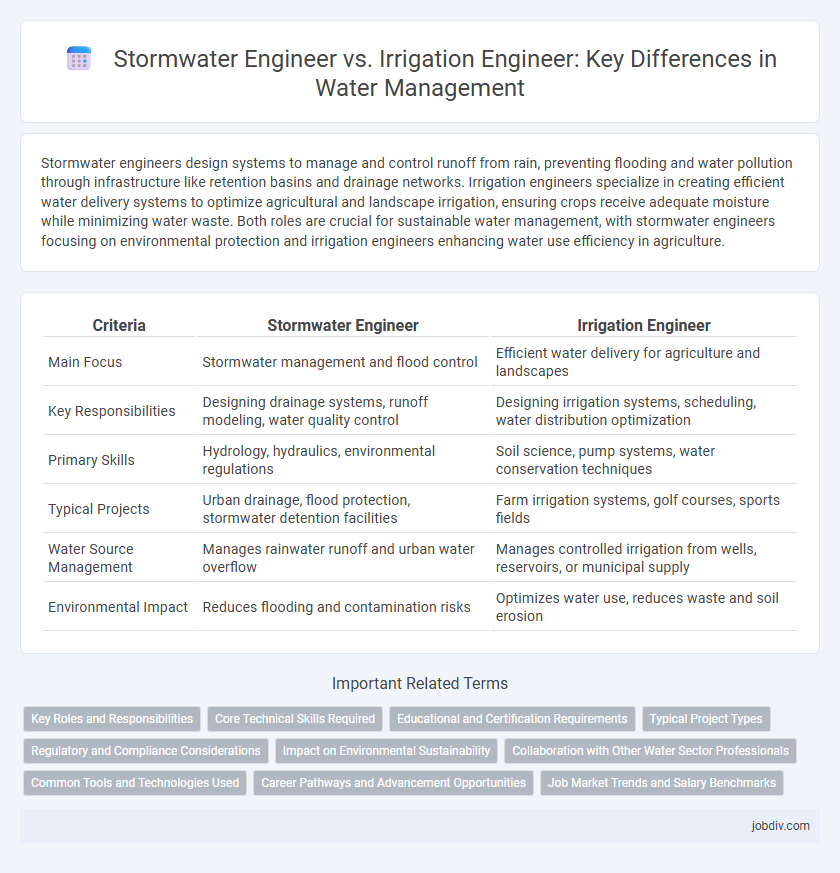Stormwater engineers design systems to manage and control runoff from rain, preventing flooding and water pollution through infrastructure like retention basins and drainage networks. Irrigation engineers specialize in creating efficient water delivery systems to optimize agricultural and landscape irrigation, ensuring crops receive adequate moisture while minimizing water waste. Both roles are crucial for sustainable water management, with stormwater engineers focusing on environmental protection and irrigation engineers enhancing water use efficiency in agriculture.
Table of Comparison
| Criteria | Stormwater Engineer | Irrigation Engineer |
|---|---|---|
| Main Focus | Stormwater management and flood control | Efficient water delivery for agriculture and landscapes |
| Key Responsibilities | Designing drainage systems, runoff modeling, water quality control | Designing irrigation systems, scheduling, water distribution optimization |
| Primary Skills | Hydrology, hydraulics, environmental regulations | Soil science, pump systems, water conservation techniques |
| Typical Projects | Urban drainage, flood protection, stormwater detention facilities | Farm irrigation systems, golf courses, sports fields |
| Water Source Management | Manages rainwater runoff and urban water overflow | Manages controlled irrigation from wells, reservoirs, or municipal supply |
| Environmental Impact | Reduces flooding and contamination risks | Optimizes water use, reduces waste and soil erosion |
Key Roles and Responsibilities
Stormwater engineers design and implement systems for managing runoff to prevent flooding, reduce erosion, and improve water quality through detention basins, green infrastructure, and drainage networks. Irrigation engineers focus on developing efficient water distribution systems tailored for agricultural and landscaping needs, optimizing water usage, and maintaining system components like pumps, valves, and pipes. Both roles require expertise in hydrology and hydraulics, but stormwater engineers emphasize stormwater management and environmental protection, while irrigation engineers prioritize water conservation and crop irrigation efficiency.
Core Technical Skills Required
Stormwater engineers require expertise in hydrology, hydraulic modeling, and stormwater management systems to design effective drainage and flood control solutions. Irrigation engineers specialize in soil-water-plant relationships, irrigation system design, and water distribution technologies to optimize agricultural water use. Both roles demand proficiency in CAD software and environmental regulations related to water resources.
Educational and Certification Requirements
Stormwater engineers typically require a degree in civil or environmental engineering with a focus on hydrology and water resources management, often combined with professional engineering (PE) licensure to certify expertise in managing urban runoff and flood control systems. Irrigation engineers usually hold degrees in agricultural or environmental engineering, emphasizing soil science and crop water needs, and may obtain certifications such as Certified Irrigation Designer (CID) or Certified Irrigation Contractor (CIC) to demonstrate specialized knowledge in efficient irrigation system design and water conservation. Both roles demand continuous education to stay current with evolving regulations, technologies, and sustainable water management practices.
Typical Project Types
Stormwater engineers typically design and implement projects such as urban drainage systems, flood control structures, and stormwater management facilities to mitigate runoff and prevent water contamination. Irrigation engineers focus on developing efficient water delivery systems for agricultural fields, landscaping, and recreational areas, including drip irrigation layouts and sprinkler system installations. Both roles require expertise in hydrology and fluid mechanics but apply their skills to different sectors of water resource management.
Regulatory and Compliance Considerations
Stormwater engineers prioritize compliance with environmental regulations such as the Clean Water Act, focusing on managing runoff, sediment control, and preventing pollutants from entering waterways. Irrigation engineers must adhere to water use permits and local water conservation laws, ensuring efficient water distribution while minimizing waste and impact on regional water supplies. Both roles require thorough knowledge of local, state, and federal regulations, with stormwater engineers often working closely with agencies like the EPA and irrigation engineers coordinating with water management districts.
Impact on Environmental Sustainability
Stormwater engineers design systems that manage runoff to prevent flooding and reduce water pollution, directly supporting environmental sustainability by protecting aquatic ecosystems and promoting groundwater recharge. Irrigation engineers develop efficient irrigation techniques that minimize water waste, ensuring sustainable agricultural water use and conserving vital freshwater resources. Both roles are crucial in advancing water management practices that align with environmental preservation goals.
Collaboration with Other Water Sector Professionals
Stormwater engineers collaborate closely with hydrologists, urban planners, and environmental scientists to design systems that manage runoff, reduce flooding, and improve water quality. Irrigation engineers work alongside agricultural specialists, soil scientists, and water resource managers to optimize water distribution for crop efficiency and conservation. Joint efforts between these professionals ensure integrated water management solutions that balance stormwater control and sustainable irrigation practices.
Common Tools and Technologies Used
Stormwater engineers utilize hydrologic modeling software such as SWMM and GIS for watershed analysis, along with detention basin design tools to manage runoff and prevent flooding. Irrigation engineers rely on soil moisture sensors, drip and sprinkler system design software, and automated control systems to optimize water use for agriculture and landscaping. Both professions leverage GIS technology to map water distribution but apply specialized tools tailored to stormwater management or irrigation efficiency.
Career Pathways and Advancement Opportunities
Stormwater engineers specialize in managing runoff and flood prevention through sustainable drainage systems, often advancing into roles in environmental consulting, urban planning, or municipal infrastructure management. Irrigation engineers focus on designing efficient water delivery systems for agriculture, with career growth leading to positions in agribusiness, water resource management, or irrigation technology development. Both fields require strong expertise in hydraulics and environmental regulations, offering opportunities for leadership in project management and specialized engineering roles.
Job Market Trends and Salary Benchmarks
Stormwater engineers specialize in managing runoff and flood control, with job market growth driven by increasing urban development and climate resilience projects, typically earning an average salary between $75,000 and $110,000 annually. Irrigation engineers focus on designing efficient water distribution systems for agriculture and landscaping, with steady demand in regions prioritizing sustainable water use, offering salaries ranging from $65,000 to $95,000 per year. Both roles benefit from expertise in water resource management software and regulatory compliance, but stormwater engineering currently shows stronger employment growth due to heightened environmental regulations and infrastructure investment.
Stormwater Engineer vs Irrigation Engineer Infographic

 jobdiv.com
jobdiv.com